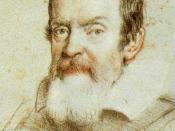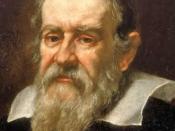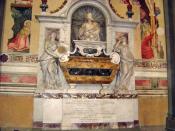Galileo Galileo Galilei was a great scientist and pioneer in the fields of mechanics, astronomy, thermometry, and magnetism, although mechanics and astronomy were his main passions (6). He was arguably one of the brightest men who ever lived. Galileo discovered and enhanced many scientific discoveries of his time period and was highly regarded as a Mathematician and Natural Philosopher. Galileo was persecuted for his views on Earth's relationship with the rest of the heavens since he believed that the Earth revolved around the Sun and that the heavens were constantly changing and evolving. Since Galilei's vision of a metamorphosing universe came in direct conflict with the views of Aristotle, views held by and supported by the church, Galileo was eventually called before the Inquisition and forced to recant his views. Nonetheless, Galileo Galilei made significant contributions to the scientific community and he is remembered as a great scientist and innovator.
Galileo Galilei was born in 1564 in Pisa, Italy (then a part of the Duchy of Tuscany), to Vincenzo Galilei, a musician, and Giulia Ammannati (6). Galileo studied medicine at the university of Pisa from 1581 to 1585, but his real interests were in mathematics and natural philosophy and Galileo left the university in 1585 without a degree. It was during this time frame that Galileo began to doubt conventional science, since much of what he was being taught at that time as scientific fact was conflicting with the evidence which he saw in his hands-on medical observations (4). Following his period as a student, Galileo tried his hand at teaching. Galileo began privately teaching in Florence and he returned to the university of Pisa to teach mathematics in 1589. Galileo taught at the university of Pisa until 1592 when he was appointed professor of mathematics at Padua (the university...


